Ditapis dengan

Green Maritime Logistics and Sustainability
The environmental consequences of international trade and transport have gained importance as a result of the current climate debate. Products are increasingly being produced in one part of the world, transported to another country and then redistributed to their final country of consumption. Since more than 80% of world trade tonnage measured in metric tons is carried by seagoing vessels, mar…
- Edisi
- 2012
- ISBN/ISSN
- 978-1-78052-340-8
- Deskripsi Fisik
- 20
- Judul Seri
- Maritime Logistics
- No. Panggil
- TXT LO LIN s
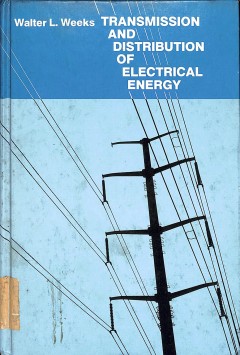
Transmission and Distribution of Electrical Energy
The book is organized to provide answer to a central questions: What problems must be faced in the design and application of some of the hardware that is required to deliver large amounts of power reliably, over considerable distances?This questions will be important for many years to come as requirements for electrical energy steadily increase.
- Edisi
- -
- ISBN/ISSN
- 0-06-046982-X
- Deskripsi Fisik
- xi, 302 p., : illus : index : 24 cm
- Judul Seri
- -
- No. Panggil
- TXT PO Wee t C.1
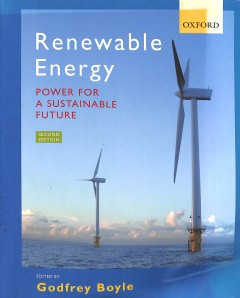
Renewable energy : power for a sustainable future
Stimulated by recent technological developments and increasing concern over the sustainability and environmental impact of conventional fuel usage, the prospect of producing clean, sustainable power in substantial quantities from renewable energy sources arouses interest world-wide. This book provides a comprehensive overview of the principal types of renewable energy-including solar, thermal p…
- Edisi
- Second Ed.
- ISBN/ISSN
- 0-19-926178-4
- Deskripsi Fisik
- xi, 452 p., 28 cm ; charts; index ; table;
- Judul Seri
- -
- No. Panggil
- LC 531.6 BOY r
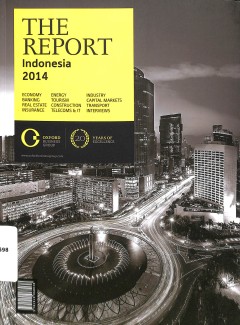
The report Indonesia 2014
On the cusp of 2014 national elections and the 2015 integration of the ASEAN Economic Community, Indonesia is poised to continue its rapid economic expansion. While the country’s natural resources are still plentiful, by channelling foreign direct investment into the right areas, the government is ensuring that true potential, in terms of value and manufacturing, is achieved. By inviting t…
- Edisi
- 2014 Ed.
- ISBN/ISSN
- 978-191-006-803-8
- Deskripsi Fisik
- 368 p., 33 cm; graphics; index; photo; table
- Judul Seri
- -
- No. Panggil
- 070.43598

Increasing the benefits of product-level benchmarking for strategic eco-effic…
Widely accepted classifications of benchmarking distinguish between different levels of benchmarking. Strategic-level benchmarking is considered to be of a higher sophistication than product-level benchmarking. Such strategic benchmarking would be based on process information instead of product information. The purpose of this paper is to research the possibility of obtaining strategic-level in…
- Edisi
- Vol. 14 No. 6, 2007 pp. 711-727
- ISBN/ISSN
- 1463-5771
- Deskripsi Fisik
- 19 p.
- Judul Seri
- Benchmarking: An International Journal
- No. Panggil
- ATC MR WEV i

Comparative evaluation of resource cycle strategies on operating and environm…
This paper examines the use of single and dual cycle operations for three types of resources, namely, quay cranes, vehicles, and yard cranes to improve the operating efficiency and reduce the energy consumption in a container terminal. Various cycle strategies are proposed and their corresponding estimation models, describing the stowage distributions of outbound and inbound containers on a shi…
- Edisi
- -
- ISBN/ISSN
- -
- Deskripsi Fisik
- 18 P.
- Judul Seri
- Transportation Research Part D
- No. Panggil
- ATC LO LEE c

Characteristics of Swedish forest biomass terminals for energy
Forest biomass terminals provide diverse services to the forest industry: buffer storage, transfers of material between different modes of transport, raw material upgrading, etc. Terminals’ operational costs are highly sensitive to their layout and design. In order to design efficient terminals, it will be essential to understand the current state of forest terminals. To this end, a survey wa…
- Edisi
- Vol. 25, No. 3, 238–246
- ISBN/ISSN
- 1913-2220
- Deskripsi Fisik
- 10 p.
- Judul Seri
- International Journal of Forest Engineering
- No. Panggil
- ATC LO KON c

Defining a convergence network platform framework for smart grid and intellig…
The challenges faced by electricity grids suggest smart grids will have to coordinate its operation with other important initiatives in areas such as transportation. The smart grid relies on the use of network platforms where meter readings and data can be transmitted. On the other hand, concerning transportation systems the need to achieve a reduction of road congestion and traffic accidents …
- Edisi
- -
- ISBN/ISSN
- 0360-5442
- Deskripsi Fisik
- 8 p.
- Judul Seri
- Energy
- No. Panggil
- ATC PO GON d

Energy management in seaports : a new role for port authorities
- Edisi
- -
- ISBN/ISSN
- -
- Deskripsi Fisik
- 9 p.
- Judul Seri
- -
- No. Panggil
- ATC PO ACC e
- Edisi
- -
- ISBN/ISSN
- -
- Deskripsi Fisik
- 9 p.
- Judul Seri
- -
- No. Panggil
- ATC PO ACC e

Greenhouse gas emissions from ships in ports – case studies in four continents
Emissions of GHG from the transport sector and how to reduce them are major challenges for policy makers. The purpose of this paper is to analyse the level of greenhouse gas (GHG) emissions from ships while in port based on annual data from Port of Gothenburg, Port of Long Beach, Port of Osaka and Sydney Ports. Port call statistics including IMO number, ship name, berth number and time spent at…
- Edisi
- -
- ISBN/ISSN
- 1361-9209
- Deskripsi Fisik
- 13 p.
- Judul Seri
- Transportation Research Part D
- No. Panggil
- ATC PO STY g

The sustainable agenda and energy efficiency: Logistics solutions and supply …
This double special issue called for logistics solutions and supply chains in times of climate change. The purpose of this editorial is to investigate the current and future implications of climate change, and in particular, energy efficiency for logistics and supply chain management (SCM).
- Edisi
- Vol. 40 No. 1/2, 2010 pp. 5-13
- ISBN/ISSN
- -
- Deskripsi Fisik
- 13 p.
- Judul Seri
- International Journal of Physical Distribution & Logistics Management
- No. Panggil
- ATC LO HAL t
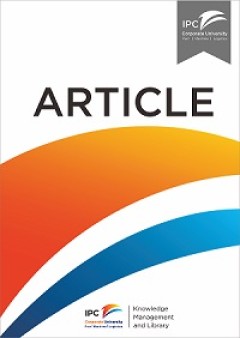
An exploratory study on low-carbon ports development strategy in China
Global warming is getting more and more attention. The whole society focuses on the low carbon and many experts do low carbon studies on industries. However, little research on low-carbon ports. According to the data from United Nations, since 1990, the emission of greenhouse gas from global trading vessels has increased by 85% and the emission of greenhouse gas from the shipping activities eac…
- Edisi
- Volume 27 Number 1
- ISBN/ISSN
- -
- Deskripsi Fisik
- 22 p.
- Judul Seri
- The asian journal of shipping and logistics
- No. Panggil
- ATC PO JIA a

Maritime security and threats to energy transportation in Southeast Asia
Southeast Asia contains some of the world’s busiest and most strategic chokepoints for maritime commerce, making it a sub-region of global strategic interest. Yet the vital energy shipments through the region are subject to potential disruption caused by maritime safety challenges, legal-passage regimes, piracy and terrorism, and inter-state conflict. In addition, potential counter-trends cou…
- Edisi
- VOL. 160 NO.2pp. 20–31
- ISBN/ISSN
- -
- Deskripsi Fisik
- 13 p.
- Judul Seri
- -
- No. Panggil
- ATC MR GRA m
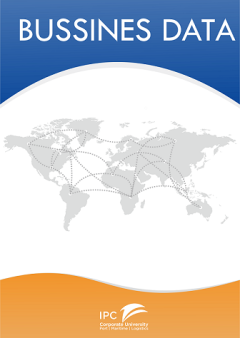
Modern Energy To Supervise First Phase Of Wind Farm
Modern Energy Management (MEM) won a contract to provide project management services for the 48MW first phase of the 144MW intertidal Tra Vinh wind farm in Vietnam (Renewables Now). Under the contract, MEM will appoint a dedicated project manager to supervise the development. The scheme, understood to be one of the country's first commercial-scale wind farms, is being developed by Woojin Co…
- Edisi
- -
- ISBN/ISSN
- -
- Deskripsi Fisik
- 1 p.
- Judul Seri
- -
- No. Panggil
- BD BMI m

Lombok Marine Energy Project Investment Finalised
SBS Energi Kelautan (SBSEK) a completed final investment decision with SBS International (SBS) to move forward with the first phase of the 150MW Nautilus marine energy project in Lombok, Indonesia. The 12MW first phase, costing USD64mn, is expected to be completed by 2020, according to SBS. The project will be implemented in three phases and will cost a total of USD750mn. SBS is expediting engi…
- Edisi
- -
- ISBN/ISSN
- -
- Deskripsi Fisik
- 1 p.
- Judul Seri
- -
- No. Panggil
- BD BMI l

Will environmental logistics be promoted by changing industrial structure? A …
With the function of reconstructing and promoting traditional industries in China, logistic service industry (LSI) still consumes a great deal of energy. The purpose of this paper is to empirically analyse the relationship between energy consumption of logistics and its influential factors in China, and through this, identify the most important factor and give a significant research of this fac…
- Edisi
- Vol. 17 Issue: 1, pp.5-14,
- ISBN/ISSN
- -
- Deskripsi Fisik
- 12 p .
- Judul Seri
- Supply Chain Management: An International Journal
- No. Panggil
- ATC LO SON w

The resilience of energy supply chains: a multiple case study approach on oil…
The purpose of this paper is to enhance the understanding about how energy supply chains work to build resilience against exogenous security threats and thereafter what support mechanisms should be introduced or improved by the European Union.
- Edisi
- Volume 19 · Number 1 · 2014 · 46–63
- ISBN/ISSN
- -
- Deskripsi Fisik
- 20 p.
- Judul Seri
- Supply Chain Management: An International Journal
- No. Panggil
- ATC LO URC t

Chapter 12 green maritime logistics and sustainability
The environmental consequences of international trade and transport have gained importance as a result of the current climate debate. Products are increasingly being produced in one part of the world, transported to another country and then redistributed to their final country of consumption. Since more than 80% of world trade tonnage measured in metric tons is carried by seagoing vessels, mari…
- Edisi
- 04 Feb 2016; 227-244.
- ISBN/ISSN
- 978-1-78052-340-8
- Deskripsi Fisik
- 20 p.
- Judul Seri
- Maritime Logistics
- No. Panggil
- ATC LO LIN c

Sustainability and energy efficiency: Research implications from an academic …
The purpose of this paper is to attempt to answer the questions posed by the special issue editors using insights from leading academics in the field and case examples drawn from two renowned global companies. It also aims to define potential avenues for further research in the thematic areas covered.
- Edisi
- Vol. 40 No. 1/2, 2010 pp. 148-158
- ISBN/ISSN
- -
- Deskripsi Fisik
- 13 p.
- Judul Seri
- International Journal of Physical Distribution & Logistics Management
- No. Panggil
- ATC LO JOH s

Financial assessment of a biodiesel value chain: case study of Chiapas, Mexic…
This paper aims to assess the biodiesel value chain produced by the State of Chiapas and, through a financial model, determines its profitability and feasibility as a business.
- Edisi
- Vol. 36 No. 12, 2013 pp. 1291-1302
- ISBN/ISSN
- -
- Deskripsi Fisik
- 13 p.
- Judul Seri
- Management Research Review
- No. Panggil
- ATC LO PER f
 Karya Umum
Karya Umum  Filsafat
Filsafat  Agama
Agama  Ilmu-ilmu Sosial
Ilmu-ilmu Sosial  Bahasa
Bahasa  Ilmu-ilmu Murni
Ilmu-ilmu Murni  Ilmu-ilmu Terapan
Ilmu-ilmu Terapan  Kesenian, Hiburan, dan Olahraga
Kesenian, Hiburan, dan Olahraga  Kesusastraan
Kesusastraan  Geografi dan Sejarah
Geografi dan Sejarah